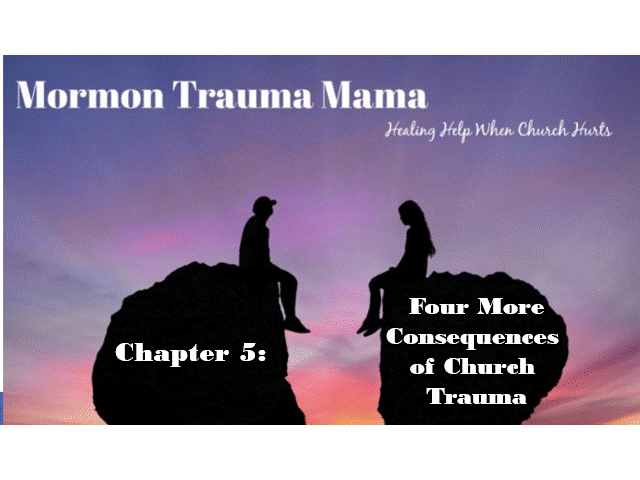Inspired Mistakes?
I recall a time several years ago when I was seeking to “hold on” in church activity due to some pretty intense leadership mistreatments that had occurred. I seemed stuck with no options to address it or heal from it. As I was so struggling with the complexity of the situation, my mind caught hold of a foreign thought: Perhaps sometimes mistakes are inspired. As I pondered on this strange thought, I began awing over what a blessing one particular “church mistake” had become in my life. I wondered: Could it have been an inspired mistake?

Our initial response to such a question is probably, “No!” In fact, my last post was about dissonance—the clashing of disharmonious elements—and the importance of such clashes. It was interesting and surprising to me that a few people told me that my writing was contrary to Christ’s teachings. They said that dissonance or disharmony was authored by Satan. “Contention is of the devil,” we are taught, thus if there is anything that is not in harmony, it is not of God. God only authors harmony.
That is our first response, right? Mistakes are the result of men’s weaknesses and are not of God! He allows them but He is not the author of them!
I politely would like to disagree. Before you shut this down, please hold with me for a minute longer! I think there is more that we need to consider. Please.
First, let us realize or remember that mistakes are not the same as sins (see Dallin H. Oaks, “Sins and Mistakes”). We all fall short but are all of our missteps sins? Is a child’s accidental dropping of a dozen eggs a sin? Of course not! An annoyance, perhaps, but not a sin.
Still, mistakes, missteps, or weaknesses often cause disharmony or contention, do they not? Yes, indeed. When I fail to prepare dinner for my hungry family because I’m trying to spit out another research paper, it can cause contention and frustration! But I have not necessarily sinned.
Okay. Now let us also remember that weaknesses are authored by God, while Satan is the author of sin. The Lord said, “I give unto men weakness that they may be humble; and my grace is sufficient for all men that humble themselves before me” (Ether 12:27, emphasis added). So does it not stand to reason that the Lord can and does inspire mistakes? Here’s a story to consider:
- Think of Joseph, who was sold into Egypt. When he met his brothers again, he bid them to come to him and explained to them that all was well—they did not need to beat themselves up anymore for selling him—for “God sent
 me before you . . . to save your lives by a great deliverance. So now it was not you that sent me hither, but God” (Genesis 45: 7-8, emphasis added). Could that have been an inspired mistake? Joseph seemed to think so. He attributed the mistake of his brothers as the Lord’s hand in their weakness. Joseph felt that God authored the mistake.
me before you . . . to save your lives by a great deliverance. So now it was not you that sent me hither, but God” (Genesis 45: 7-8, emphasis added). Could that have been an inspired mistake? Joseph seemed to think so. He attributed the mistake of his brothers as the Lord’s hand in their weakness. Joseph felt that God authored the mistake.
We could take this further. We could consider other stories of when the Lord authored disharmonious paths: Abraham’s command to sacrifice Isaac; the destruction of Sodom and Gomorrah; Daniel’s inspiration to continue to pray despite the law; Nephi’s commission to cut off the head of Laban; etc. There are numerous stories.
But as we examine this further, it is not hard to see that disharmony is a part of life, a part God seems to have His hand in. Our own bodies, which are of God, are by nature disharmonious. The elements He created are also in dissonance. Clouds  create storms; animals experience the survival of the fittest; fires destroy forests. All of these are features authored by God, not Satan. Good comes from such God-commissioned dissonance–from each one of them, despite the painful progress.
create storms; animals experience the survival of the fittest; fires destroy forests. All of these are features authored by God, not Satan. Good comes from such God-commissioned dissonance–from each one of them, despite the painful progress.
We even read in 2 Thessalonians 2:11 the words” “God shall send them strong delusion.” Yes, indeed it seems that God can and is often behind disharmony.
I believe that teaching otherwise—teaching the need for constant harmony—can do great damage in our society. In a church setting, it can cause us to think that we always have to keep discussions on the surface. We are afraid of anything that might appear contentious. We are afraid of driving the Spirit out. We don’t want to bring up the tough, dissonant issues. We don’t want to get too real. But the undercurrents I see in this is not  better harmony but greater discord. True harmony takes works. It does not just happen. It cannot happen without a lot of effort. Nothing worthwhile does. Sometimes there are a lot of dissonant notes before anything really comes together. I think this is how life is supposed to be! I have lived with a lot of piano players in my days! And I have heard a lot of bad sounds before the beauty comes through. It takes patience; it takes faith; it takes work. It stands to reason that this is the way God’s laws work too. Neal A. Maxwell also seems to think so. He said, “One cannot have both a faith-filled and a stress-free life.” Yes, I believe dissonance is part of His divine plan.
better harmony but greater discord. True harmony takes works. It does not just happen. It cannot happen without a lot of effort. Nothing worthwhile does. Sometimes there are a lot of dissonant notes before anything really comes together. I think this is how life is supposed to be! I have lived with a lot of piano players in my days! And I have heard a lot of bad sounds before the beauty comes through. It takes patience; it takes faith; it takes work. It stands to reason that this is the way God’s laws work too. Neal A. Maxwell also seems to think so. He said, “One cannot have both a faith-filled and a stress-free life.” Yes, I believe dissonance is part of His divine plan.
Here’s my last post in case you missed it: Are Happiness and Dissonance in Opposition?




3 Comments
Jill
Definitely something to ponder. Thank you.
Patrick Hennessy
Just my opinion but it is totally fine to disagree.
Why else is counsel so important within the Church.
Growth often comes when we are uncomfortable.
LYDIA
Your article is very thought provoking and well written. Good examples of good results from disharmony and I agree that when you don’t work through disharmony, it’s damaging. Put up and shut up is very degrading and spiritually stifling.